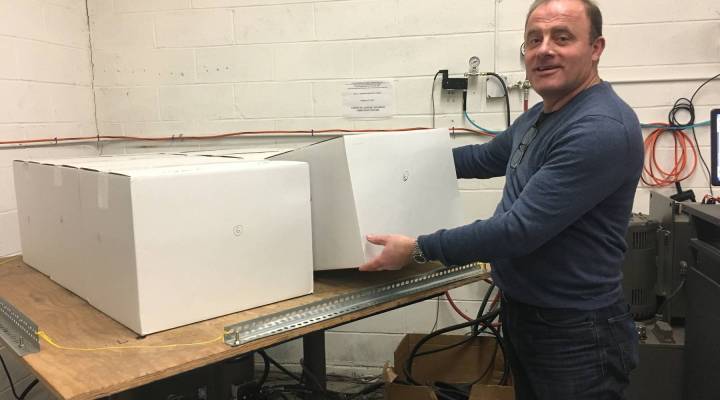
For online retailers, packaging is all about economics

ANAMA Package and Container Testing is located in a small warehouse just outside New York City that is full of strange metal machines that evaluate retail shipping design.
The first stop for packages is the drop test. Next is a two and a half hour delivery test on a platform that gyrates to simulate driving. Then it’s back to the drop test. The high level of testing comes with good reason.
“So it was determined that an average package is being dropped 17 times,” said ANAMA owner Anton Cotaj. That’s why retailers ship stuff in over-sized boxes with lots of padding, in an effort to prevent goods from being damaged in the process.
“That would be the safest way. But of course that’s not the sustainable way,” said Hae Chang Gea, who directs the package engineering program at Rutgers University.
As online shopping grows, so does the retail shipping industry. But customers are getting vocal about their shipping waste guilt. And big boxes aren’t efficient for retailers either. That has engineers scrambling to make package design more efficient to reduce shipping cost and material waste, while protecting what’s inside the package.
“If you have empty space in a box you are shipping air,” Gea said.
Air-filled boxes mean UPS and FedEx could be squeezing more into their trucks. So now they are pressuring retailers to fix the problem by charging by not just weight, but also size.
But engineering a new package for every product takes time, and some are just plain awkward to ship. Top of the list?
“Spray top bottles can get broken in shipment,” said Kara Hurst, head of sustainability at Amazon.
Then there’s the all that clunky display packaging, which looks nice at a store but doesn’t serve a purpose online.
“We’re also looking at how we work with vendors and think about how they can prepare the products and that those products can ship in their own container.”
And some shipping experts are starting to think ahead to the days when drones are delivering our stuff. But of course that would require a whole new level of testing.
Meanwhile, it’s hard to say how long it will take for packages that come to us on the road to become more efficient and less wasteful. Those in the business say that they are looking at a timeline of at least five years.
| Retailers rethink physical stores as online shopping grows |
| How some brick-and-mortar retailers will survive e-commerce |
There’s a lot happening in the world. Through it all, Marketplace is here for you.
You rely on Marketplace to break down the world’s events and tell you how it affects you in a fact-based, approachable way. We rely on your financial support to keep making that possible.
Your donation today powers the independent journalism that you rely on. For just $5/month, you can help sustain Marketplace so we can keep reporting on the things that matter to you.












